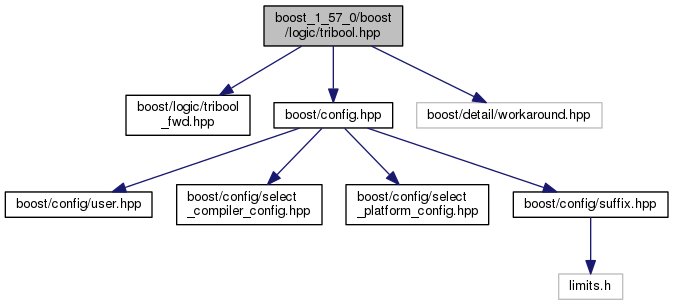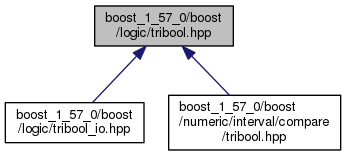|
| bool | boost::logic::indeterminate (tribool x, detail::indeterminate_t dummy=detail::indeterminate_t()) |
| | Keyword and test function for the indeterminate tribool value. More...
|
| |
| tribool | boost::logic::operator! (tribool x) |
| | Computes the logical negation of a tribool. More...
|
| |
| tribool | boost::logic::operator&& (tribool x, tribool y) |
| | Computes the logical conjuction of two tribools. More...
|
| |
| tribool | boost::logic::operator&& (tribool x, bool y) |
| | This is an overloaded member function, provided for convenience. It differs from the above function only in what argument(s) it accepts. More...
|
| |
| tribool | boost::logic::operator&& (bool x, tribool y) |
| | This is an overloaded member function, provided for convenience. It differs from the above function only in what argument(s) it accepts. More...
|
| |
| tribool | boost::logic::operator&& (indeterminate_keyword_t, tribool x) |
| | This is an overloaded member function, provided for convenience. It differs from the above function only in what argument(s) it accepts. More...
|
| |
| tribool | boost::logic::operator&& (tribool x, indeterminate_keyword_t) |
| | This is an overloaded member function, provided for convenience. It differs from the above function only in what argument(s) it accepts. More...
|
| |
| tribool | boost::logic::operator|| (tribool x, tribool y) |
| | Computes the logical disjunction of two tribools. More...
|
| |
| tribool | boost::logic::operator|| (tribool x, bool y) |
| | This is an overloaded member function, provided for convenience. It differs from the above function only in what argument(s) it accepts. More...
|
| |
| tribool | boost::logic::operator|| (bool x, tribool y) |
| | This is an overloaded member function, provided for convenience. It differs from the above function only in what argument(s) it accepts. More...
|
| |
| tribool | boost::logic::operator|| (indeterminate_keyword_t, tribool x) |
| | This is an overloaded member function, provided for convenience. It differs from the above function only in what argument(s) it accepts. More...
|
| |
| tribool | boost::logic::operator|| (tribool x, indeterminate_keyword_t) |
| | This is an overloaded member function, provided for convenience. It differs from the above function only in what argument(s) it accepts. More...
|
| |
| tribool | boost::logic::operator== (tribool x, tribool y) |
| | Compare tribools for equality. More...
|
| |
| tribool | boost::logic::operator== (tribool x, bool y) |
| | This is an overloaded member function, provided for convenience. It differs from the above function only in what argument(s) it accepts. More...
|
| |
| tribool | boost::logic::operator== (bool x, tribool y) |
| | This is an overloaded member function, provided for convenience. It differs from the above function only in what argument(s) it accepts. More...
|
| |
| tribool | boost::logic::operator== (indeterminate_keyword_t, tribool x) |
| | This is an overloaded member function, provided for convenience. It differs from the above function only in what argument(s) it accepts. More...
|
| |
| tribool | boost::logic::operator== (tribool x, indeterminate_keyword_t) |
| | This is an overloaded member function, provided for convenience. It differs from the above function only in what argument(s) it accepts. More...
|
| |
| tribool | boost::logic::operator!= (tribool x, tribool y) |
| | Compare tribools for inequality. More...
|
| |
| tribool | boost::logic::operator!= (tribool x, bool y) |
| | This is an overloaded member function, provided for convenience. It differs from the above function only in what argument(s) it accepts. More...
|
| |
| tribool | boost::logic::operator!= (bool x, tribool y) |
| | This is an overloaded member function, provided for convenience. It differs from the above function only in what argument(s) it accepts. More...
|
| |
| tribool | boost::logic::operator!= (indeterminate_keyword_t, tribool x) |
| | This is an overloaded member function, provided for convenience. It differs from the above function only in what argument(s) it accepts. More...
|
| |
| tribool | boost::logic::operator!= (tribool x, indeterminate_keyword_t) |
| | This is an overloaded member function, provided for convenience. It differs from the above function only in what argument(s) it accepts. More...
|
| |

